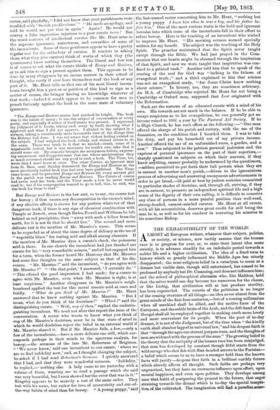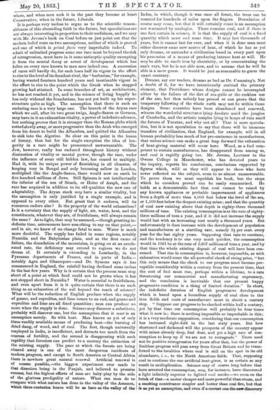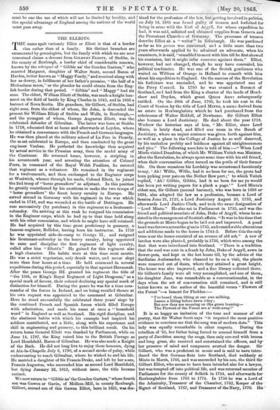THE EXHAUSTIBILITY OF THE WORLD:
ALMOST all European writers, whatever their subject, polities, or society, or science, now tacitly assume that the human: race is to progress for ever, or, to state their latent idea more strictly, is to advance steadily for an indefinite period towards a nobler life and a higher civilization. The idea of a fixed term to history which so greatly influenced the Middle Ages has utterly disappeared ; the semi-religious belief in a cataclysm to occur at a distant but visible date, though still entertained, has ceased to be professed by anybody but Dr. Cumming, and does not influence him; and the school of philosaphical alarmists who, like Malthus, held that the mites would one day become too numerous for the cheese, or like Liebig, that civilization will at last produce sterility, has been superseded. The reverie of the politician is no longer of the coming overturn of all things—an idea never absent from the great minds of the first four centuries,—but of a coming millennium when all mankind shall be allied, and the motive force of the European,. and the subtle brain of the Arab, and the deft hand of the Mongol shall all be employed together in making earth more lovely and m,ore convenient for its people. When the poet of to-day dreams, it is not of the Judgment, but of the time when "the kindly earth shall slumber lapped in universal law," and his deepest faith is that "through the ages one eternal purpose runs, and the thoughts of men are widened with the process of the suns." The growing belief in the theory that the antiquity of the human race has been misjudged, that man has developed by constant though fitful starts from the wild savage who shot fish with flint-headed arrows to the Parisian- s belief which seems to us to have a stronger hold than the known facts will justify—deepens that faith in a brilliant earthly future which already affects all thought. Such faiths are perhaps very unpractical, but they have an enormous influence upon.effort, upon mental happiness, and even upon politics. They develops among men that habit, of postponing the present to' the future, that eager straining towards the distant which is to-day the special tempta- tioik of the cultivated. Tim imAginatiou will find a paradise some-
where, and when men seek it in the past they become at heart Conservative, when in the future, Liberals.
It is perhaps very useless to argue as to the scientific reason- ableness of this abounding faith in the future, but speculations are. not always interesting in proportion to their usefulness, and we may with Mr. Jevons's book on Coal before us just point out that the modern belief rests on two assumptions, neither of which is proved and one of which is primti facie very improbable indeed. To. admit of unlimited progress some one race must be beyond the risk of retrogression, must have in it some antiseptic quality exempting it from the mental decay or arrest of development which has fallen on every race known to man save indeed one. A succession of rates will hardly do, for each loses half its vigour in the effort to rise to the level of its decadent rival, the "barbarian," for example, having wasted fourteen hundred years and inestimable vigour in the effort to rise to the point which the Greek when he stopped growing had attained. In some branches of art, as architecture, he has not reached it yet, and in the science of living happily he has only widened the foundations, has not yet built up his super- structure quite so high. The assumption that there is such an enduring race is a very large one. The branch of the Aryan race which we call, after its two great twigs, Anglo-Saxon or German, may have in it an exhaustless vitality, a power of indefinite advance, but nothing proves that it is stronger than the Roman plebs which rotted slowly away, or more progressive than the Arab who emerged from his desert to build the Alhambra, and quitted the Alhambra to sink into the Algerine. So clear on this point is the lesson of history, that. but for the single exception the idea of lon- gevity in a race might be pronounced unwarrantable. The Jew, however, really has endured throughout history without diminution of vitality or mental power, though the race, under the influence of some still hidden law, has ceased to multiply. Had it, with its unique power of flourishing in all climates, of keeping rosy in Bengal and only becoming sallow in London, multiplied like the Anglo-Saxon, there would now on earth be five hundred milliona of Jews. Still Spinoza is not intellectually the inferior of the son of Sirach, or Heine of Asaph, and the race has acquired in addition to its old qualities the new one of adaptability. The Aryan stock may have a similar vitality, but the assumption is only justified by a single example, and is opposed to every other. But grant that it endures, will its resources endure also? Is the property of the world exhaustless? Is it a certainty that the supply of light, air, water, heat, and the constituents, whatever they are, of fruitfulness, will always remain the same? As to light, that may be assumed,—though granting in- definite time, astronomers have something to say on that point,— and in air, we know of no change fatal to man. Water is much more doubtful. The supply has failed in some regions, notably Numidia and the Babylonian plain, and as the first cause of failure, the denudation of the mountains, is going on at an accele- rated rate, the deficiency may extend to regions we do not dream of. It certainly is extending in Lombardy, in the Pyrenean departments of France, and in parts of India — notably Agra and Ghazeepore—and Dr. Symons says it has commenced in England, the rainfall having declined some inches in the last few years. Why is it certain that the process must stop short of a point at which food could not be grown when it has not stopped short in Numidia ? Water is essential to fruitfulness, and even apart from it is it quite certain that there is no such thing as an exhaustion of the soil beyond the reach of science? What will be the reduction of English produce when the supply of guano, and coprolites, and lime comes to an end, and guano and ooprolites and lime are all fixed quantities ; man can produce no more when the supply is done. Science may discover a substitute, probably will discover one, but the assumption that it must is an assumption merely. So with heat. Man knows as yet of only three readily available means of producing heat—the burning of dried dung, of wood, and of coal. The first, though universally employed in India, is insufficient, and detracts too much from the %owes of fertility, and the second is disappearing with such rapidity that foresters can predict to a ceutury the extinction of the existing. supply. The pace at which the forests are being cleared away is one of the most dangerous incidents of modern progress, and except in South America or Central Africa there is nowhere great natural renewal. Artificial renewal is of course possible,—the biggest experiment ever made in that direction being in the Punjab, and believed to promise success, but the highest efforts of man are baby-play by the aide of the glorious prodigality of nature. What can man do to compare with what nature has done in the valley of the Amazon, I which three centuries hence will be as bare as the valley of the Indus, in which, though it was once all forest, the trees can be counted for hundreds of miles upon the fingers. Denudation of course may cease, but that it will certainly cease is an assumption not warranted by analogies. There remains coal, and if there is one fact certain in science, it is that the supply of coal is a fixed quantity which must end some time. It may last thousands of years, but it cannot last for ever, and when it is done man must either discover some new source of heat, of which he has as yet only dreams, or surrender a civilization based in every part upon his possession of a means of producing intense heat at will. He may be able to smelt iron by electricity, or by concentrating the sun's rays, but he is not able now, and to assume that he will be able is a mere guess. It would be just as reasonable to-guess the exact contrary.
Dreams, say our readers, dreams as bad as Dr. Cumming's. Not a doubt of it, for we have intentionally omitted the primary element, that Providence whose designs cannot be interrupted either by the failure of the dirt of sea-gulls or the reckless use of the axe, but then nobody has proved or can prove that the temporary fallowing of the whole earth may not be within those designs. Some countries have been abandoned and renewed, witness the wonderful structures lying desolate amid the jungles of Cambodia, and the artistic temples lying in heaps of ruin amid the forests of Yucatan, and why not all? That is mere specula- tion, but it is not speculation to say that there will be immense transfers of civilization, that England, for example, will in all human probability lose much of her pre-eminence in manufactures, that unless science can make a great leap forward the exhaustion of heat-giving material will occur here. Wood, as a fuel com- petent to sustain manufactures, has disappeared from among us, and coal is rapidly going too. Mr. Jevons, Lecturer to the Owens College in Manchester, who has devoted years to the inquiry, reports his conclusions, conclusions supported by figures which, wild as they will appear to those who have never reflected on the subject, seem to us almost unanswerable. To prove them we mast republish his book, but the steps which he considers proved can be easily summarized. He holds as a demonstrable fact that coal cannot be raised by any known appliances or probable improvement of appliances from a depth of more than 4,000 feet below the level of the sea, or 1,500 feet below the deepest existing mine; and that the quantity of coal now existing above that depth is eighty-three thousand millions of tons. The existing consumption is at the rate of eighty- three millions of tons a year, and if it did not increase the supply would last with an increasing cost nearly a thousand years. But unfortunately it does increase with the development of population and manufactures at a startling rate, namely Si per cent. every year for the last eighty years. Supposing that rate to continue, and the tendency is to one very much quicker, the consumption would in 1961 be at the rate of 2,607 millions of tons a year, and by that time the whole existing deposit of coal will have been con- sumed. That rise in consumption is, however, impossible, as with exhaustion would come the all-powerful check of rising price, "but this only means that the check to our progress must become per- ceptible considerably within a century from the present time, that the cost of fuel must rise, perhaps within a lifetime, to a rate threatening our commercial and manufacturing supremacy, and the conclusion is inevitable that our present happy progressive condition is a thing of limited duration." In short, the indefinite duration of English progressive development which is based upon a boundless supply of coal close to the iron fields and seats of manufacture must in about a century stop. "Suppose our progress to be checked within half a century, yet by that time our consumption will probably be four times what it now is ; there is nothing impossible or improbable in this; it is a very moderate supposition, considering that our consumption has increased eight-fold in the last sixty years. But how shortened and darkened will the prospects of the country appear
with mines already deep, fuel dear, and yet a high rate of con- sumption to keep up if we are not to retrograde." There need not be positive retrogression for years after that, but the power of
limitless progress will pass away from Great Britain and be trans- ferred to the localities where coal is still on the spot in. its old abundance, i. e., to the North American fields. That, supposing
coal to continue the one artificial heat-giver, is as certain as any result in multiplication. Soience may of course long before that have arrested the consumption, may, for instance, have discovered a light infinitely superior to lighted coal smoke—we seem on the brink of that—a motor cheaper and more powerful than steam, and
a smelting contrivance simpler and hotter than coal fire, but that is as yet an assumption, and even if &correct one the neerdiscovery
Inuit be one the use of which will not be limited by locality, and the special advantage of England among the nations of the world must pass away.
































 Previous page
Previous page